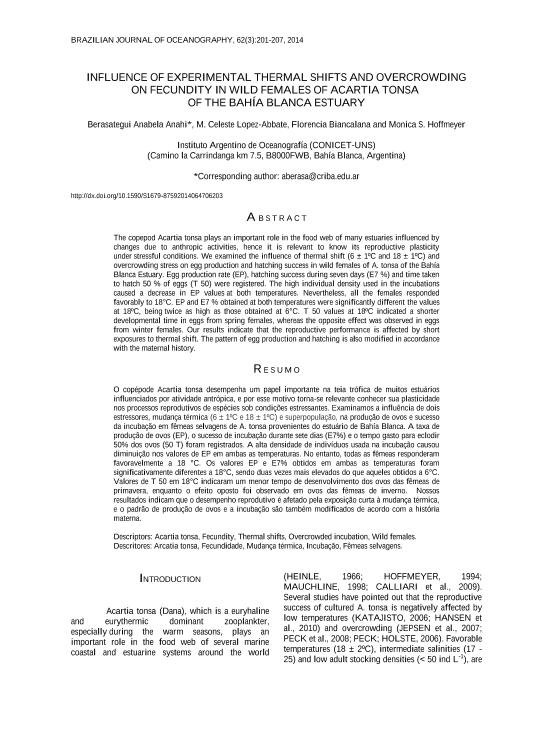Artículo
The copepod Acartia tonsa plays an important role in the food web of many estuaries influenced by changes due to anthropic activities, hence it is relevant to know its reproductive plasticity under stressful conditions. We examined the influence of thermal shift (6 ± 1ºC and 18 ± 1ºC) and overcrowding stress on egg production and hatching success in wild females of A. tonsa of the Bahía Blanca Estuary. Egg production rate (EP), hatching success during seven days (E7 %) and time taken to hatch 50 % of eggs (T 50) were registered. The high individual density used in the incubations caused a decrease in EP values at both temperatures. Nevertheless, all the females responded favorably to 18°C. EP and E7 % obtained at both temperatures were significantly different the values at 18ºC, being twice as high as those obtained at 6°C. T 50 values at 18ºC indicated a shorter developmental time in eggs from spring females, whereas the opposite effect was observed in eggs from winter females. Our results indicate that the reproductive performance is affected by short exposures to thermal shift. The pattern of egg production and hatching is also modified in accordance with the maternal history. O copépode Acartia tonsa desempenha um papel importante na teia trófica de muitos estuários influenciados por atividade antrópica, e por esse motivo torna-se relevante conhecer sua plasticidade nos processos reprodutivos de espécies sob condições estressantes. Examinamos a influência de dois estressores, mudança térmica (6 ± 1ºC e 18 ± 1ºC) e superpopulação, na produção de ovos e sucesso da incubação em fêmeas selvagens de A. tonsa provenientes do estuário de Bahía Blanca. A taxa de produção de ovos (EP), o sucesso de incubação durante sete dias (E7%) e o tempo gasto para eclodir 50% dos ovos (50 T) foram registrados. A alta densidade de indivíduos usada na incubação causou diminuição nos valores de EP em ambas as temperaturas. No entanto, todas as fêmeas responderam favoravelmente a 18 °C. Os valores EP e E7% obtidos em ambas as temperaturas foram significativamente diferentes a 18°C, sendo duas vezes mais elevados do que aqueles obtidos a 6°C. Valores de T 50 em 18°C indicaram um menor tempo de desenvolvimento dos ovos das fêmeas de primavera, enquanto o efeito oposto foi observado em ovos das fêmeas de inverno. Nossos resultados indicam que o desempenho reprodutivo é afetado pela exposição curta à mudança térmica, e o padrão de produção de ovos e a incubação são também modificados de acordo com a história materna.
Influence of experimental thermal shifts and overcrowding on fecundity in wild females of Acartia tonsa of the Bahía Blanca estuary
Berasategui, Anabela Anhi ; Lopéz Abate, M. Celeste; Biancalana, Florencia
; Lopéz Abate, M. Celeste; Biancalana, Florencia ; Hoffmeyer, Monica Susana
; Hoffmeyer, Monica Susana
 ; Lopéz Abate, M. Celeste; Biancalana, Florencia
; Lopéz Abate, M. Celeste; Biancalana, Florencia ; Hoffmeyer, Monica Susana
; Hoffmeyer, Monica Susana
Fecha de publicación:
09/2014
Editorial:
Instituto Oceanográfico
Revista:
Brazilian Journal Of Oceanography
ISSN:
1679-8759
e-ISSN:
1982-436X
Idioma:
Inglés
Tipo de recurso:
Artículo publicado
Clasificación temática:
Resumen
Palabras clave:
Acartia Tonsa
,
Fecundity
,
Thermal Shift
,
Wild Females
Archivos asociados
Licencia
Identificadores
Colecciones
Articulos(IADO)
Articulos de INST.ARG.DE OCEANOGRAFIA (I)
Articulos de INST.ARG.DE OCEANOGRAFIA (I)
Citación
Berasategui, Anabela Anhi; Lopéz Abate, M. Celeste; Biancalana, Florencia; Hoffmeyer, Monica Susana; Influence of experimental thermal shifts and overcrowding on fecundity in wild females of Acartia tonsa of the Bahía Blanca estuary; Instituto Oceanográfico; Brazilian Journal Of Oceanography; 62; 3; 9-2014; 201-207
Compartir
Altmétricas



